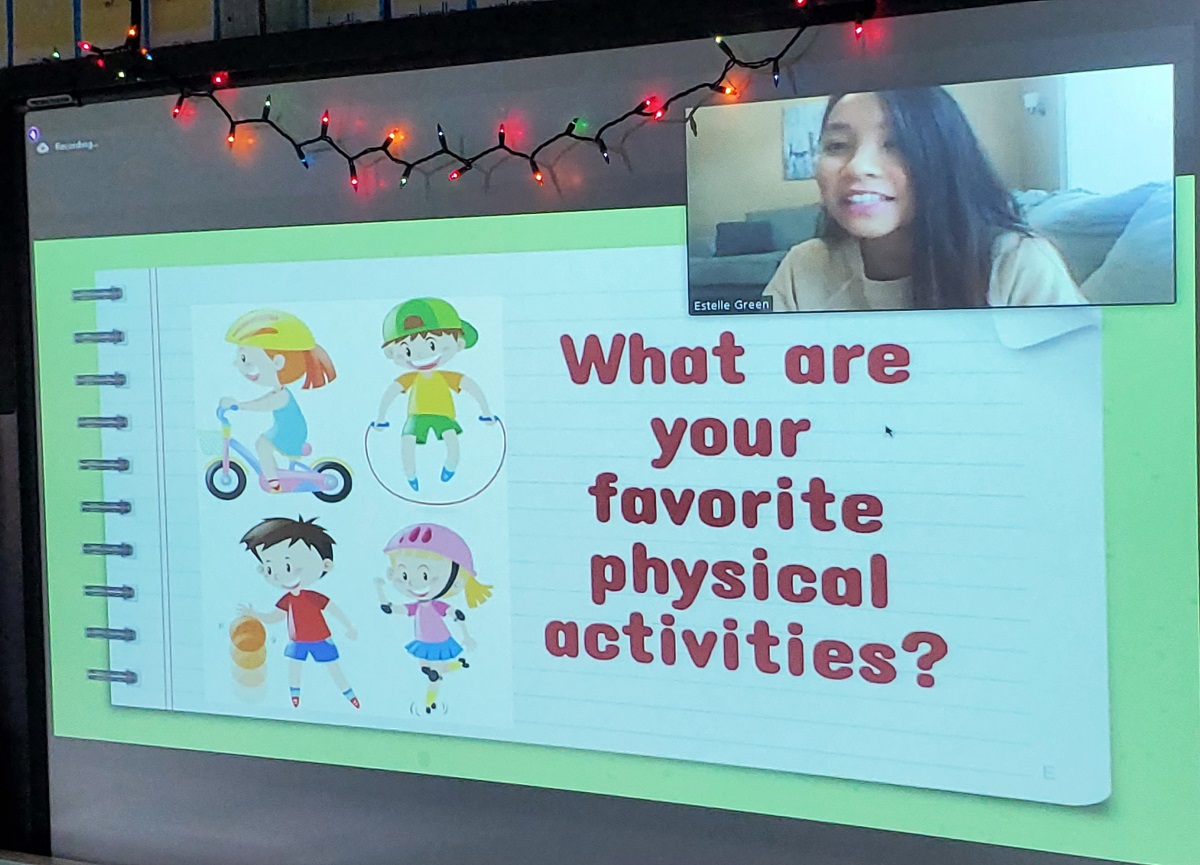Classroom flip: Penn State College of Medicine students become teachers of elementary students

When first-year Penn State College of Medicine student Estelle Green asked some Centre County second-graders about their favorite physical activity, the answers looked more like show-and-tell than a wellness class.
Squares of students on the computer screen suddenly lit up with lots of activity – one girl pretended to jump rope, one boy hooked a couple of virtual free throws and another did pushups that continued long into the next questions.
The students in teacher Tina Bickel’s Wingate Elementary School, part of the Bald Eagle School District, have been learning about healthy eating, managing emotions positively, good exercise and COVID-19 prevention from first-year College of Medicine students who volunteered their time to teach during the past couple of months.
Their recent lesson on exercise included an interactive aspect that demonstrated how doing jumping jacks makes the heart beat faster than 20 seconds of hand-washing. The out-of-breath students—elementary and College of Medicine—felt the answer firsthand.
In the challenging new world of hybrid and remote learning, the energy and enthusiasm of the medical students is most welcome, said Bickel, who especially appreciated their teaching about the coronavirus.
“I remind my students frequently to wear their masks correctly and wash their hands, but the medical students did a great job of teaching them why they’re doing all of this in a fun, non-scary way,” she said. “The class has carried the knowledge and hand-washing activities into our classroom and their homes, which is great to see.”
The medical students say the opportunity inspired them as much as the kids.
“I feel like I have learned so much from working with them, like how to stay positive and happy amid all the challenges thrown at us with the pandemic,” said Sean Reid.
“The students are always very engaged,” Green said. “They are full of questions and always eager to participate.”
A dozen College of Medicine students split into two teams to teach second and third graders in a collaboration that began last year when some medical students from the University Park Curriculum and Wingate Elementary staff connected over a community health survey. After the meeting, Wingate Elementary staff asked about doing some health lessons with their students.
Medical student Lauren Pomerantz jumped at the chance to help children set healthy habits for the future. “Education is a key component – by starting early, they are more likely to be health literate and make informed decisions about their health,” she said.
Rachel Roy said the unknowns of the remote learning experience – how it would run with Zoom, not meeting the teacher in advance, not knowing if the kids would be engaged – were similar to the unknowns in medicine. “With each exam room, you have no idea what you’re going to get,” she said. “I think it’s important to start getting more comfortable with the new and unknown.”
Medical students said the experience with young children helps prepare them for their future medical careers.
“This has been a great reminder of how to effectively communicate with children, how to keep them engaged and make them feel comfortable,” Tilicea Henry said. “The tips I learned from these sessions will definitely help me in my future practice when I have to care for pediatric patients.”
Ryan Murphy said teaching the classes made him realize that, for pediatric patients especially, he will need to explain what’s going on in terms they understand. “It’s not as easy as it sounds!” he added.
Just having the chance to hang out with some kids made the experience special, Maddie Snyder said. “Especially during these times where opportunities to get involved and make connections are hard to come by, I was excited to work with the youth of my local community,” she said.
Help us share the good news going on at Penn State Health, including small happenings that might otherwise go unnoticed. Have a “Pawsitivity” story to share with us? Email us and write “Pawsitivity” in the subject line.
If you're having trouble accessing this content, or would like it in another format, please email Penn State Health Marketing & Communications.
